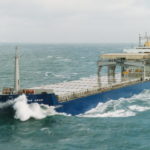The EU regulation for ship recycling (EU SRR) entered into force in January. EU-flagged vessels need to be scrapped at an approved facility. HANSA talked to Martin Dorsman and Gudrun Janssens of European Community Shipowners’ Association about chances and challenges
How do you assess the co-existence of Hong Kong Convention and EU SRR?
Martin Dorsman: The general comment on that is that we are a global industry that needs global regulations. For ship recycling, we have the Hong Kong Convention. The point is, that it has not been ratified by enough countries, yet. We are urging countries to ratify. The good thing about the European regulation in this respect is that its aims are also to have the HKC ratified as soon as possible and to increase standards globally. Because it is clear that a lot of what is happening in ship recycling yards should be a thing of the past.
Janssens: We are happy to see that states think alike, as Turkey ratified the HKC. It is the next logical step. Although they have two facilities on the European List, they still choose to ratify the HKC because they realize, that you need a global instrument to create a level playing field. The regulation is facilitating the HKC and the European list is an incentive for third countries to upgrade their facilities.
Do you expect more regional regulation?
Janssens: I haven’t heard anything like that. However, if there are any regional arrangements, I would assume that they would try to also facilitate the HKC. I think most IMO states agree to the opinion, that there is a need for a global level playing field.
Is it still an option to change flag shortly before selling the ship for recycling?
Dorsman: We should take the global perspective into account. EU shipowners control 40% of the global fleet, 20% of the global fleet is EU flagged. So half of the vessels managed by EU owners are non-EU flagged. A big part of those vessels don’t call at European ports. That’s why we say that we need approved facilities outside the EU, too. And that’s why we say we need a global level playing field in order for EU shipowners to remain competitive.
The recycling facilities in Asia are probably much more competitive pricewise …
Janssens: In the end, it doesn’t matter if a European shipowner receives 20$ per ldt or 200$ as long as his competitor receives the same amount and all have to meet the same requirements.
There was a proposal during the debate for a European regulation to offer financial assistance to shipowners who send ships to a facility on the EU list. What happened to that idea?
Dorsman: At this moment there is no work being done on a financial instrument. But it depends of course on the ratification of the HKC and the question whether we do still need any financial instrument.
Janssens: The Commission and the member states agreed rightfully to wait and see. What if the EU-SRR with an adequate list of facilities and a good enforcement works as it is? If it works, no one needs to invest in a very expensive financial mechanism.
How do you assess the chance, that South-Asian shipyards are included in the EU list?
Dorsman: The positive element from the EU regulation that we see, is that non-EU yards want to be on the list, because then they could do business with European shipowners of EU-flagged vessels. At this moment, 13 Indian yards applied, but none of them haven been approved yet. But we know that the European Commission visited some of them. We told the Commission that it is very important to make their reports transparent so that everybody can learn from it. There is a whole process that has being set in motion.
Janssens: The Commission recently visited two Indian yards and they said, that at this stage they were not sufficiently compliant to the EU-SRR. But they clearly indicated that the doors are open. We are very much looking forward to that and we hope that the Commission provides sufficient transparency and also assistance to encourage the improvements. Imagine, if you are a yard and you have made all this investments and you see that it isn’t really worthwhile. If you see that your neighbouring facilities doing nothing and also making a business, maybe a profitable business, because it doesn’t do all this additional environmentally and safety measures, then you could say, ok, let this European list be what it is, I am not applying anymore. It is important that the Commission continues to keep in touch with the facilities.
Are you rather optimistic that there will be a global level playing field for European shipowners in the near future?
Dorsman: If I look at what the Commission is doing and what Indian yards are doing to get on the list, I see that there definitely is a positive development and we urge all parties to support that. We see that there is a momentum now and we must keep it alive.
Interview: Michael Meyer



















